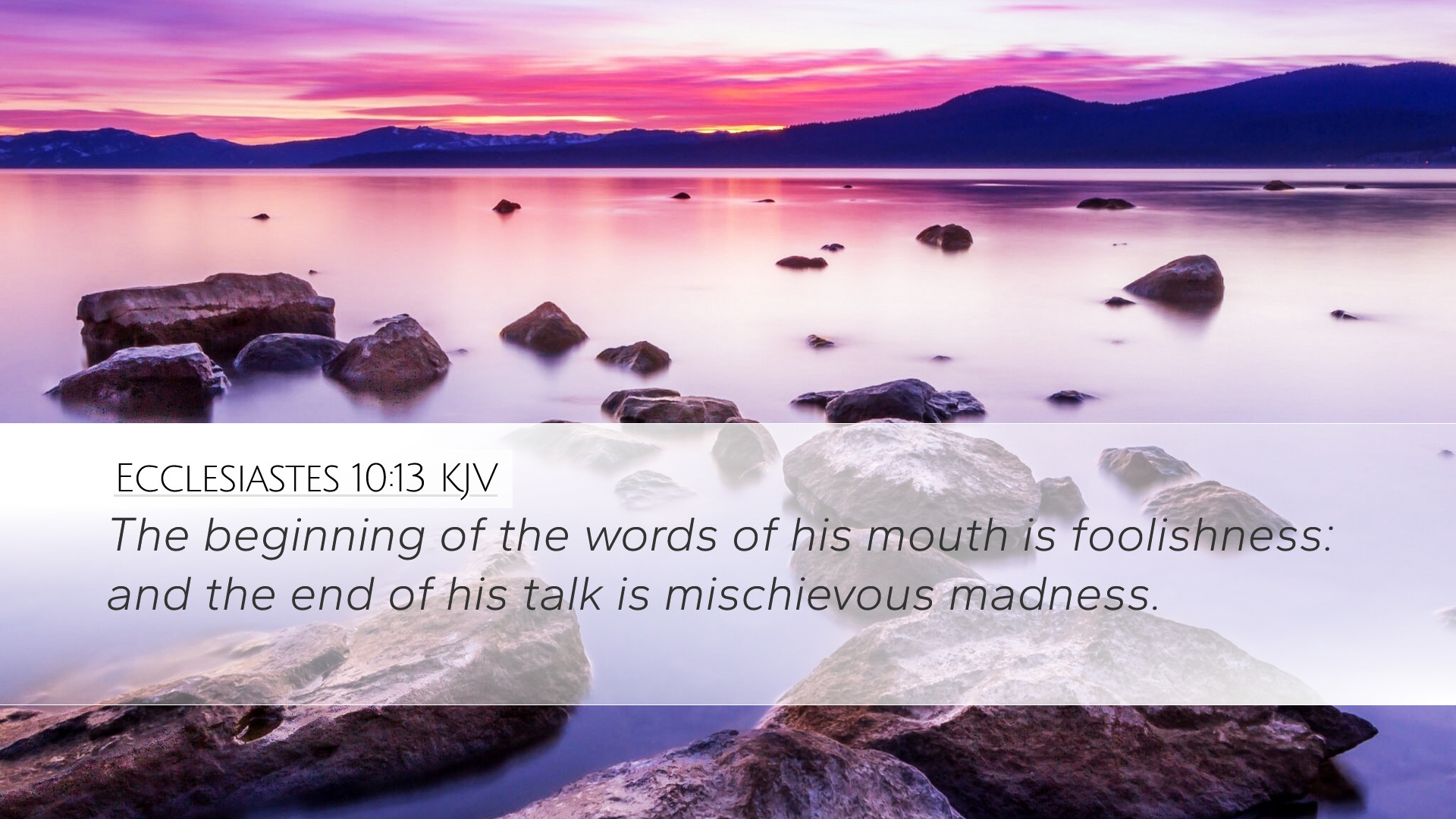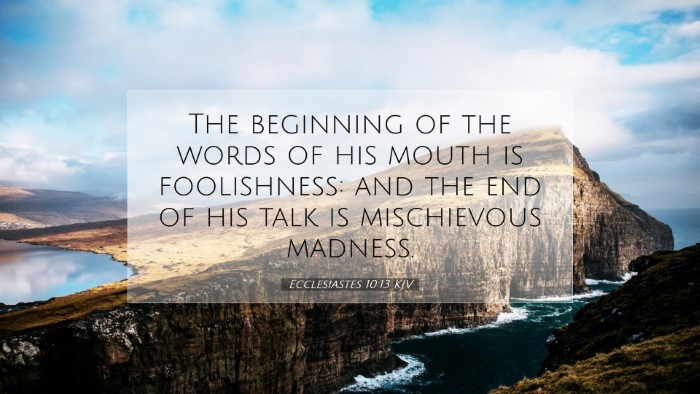Ecclesiastes 10:13 - A Comprehensive Commentary
Bible Verse: "The beginning of the words of his mouth is foolishness: and the end of his talk is mischievous madness."
This verse from Ecclesiastes 10:13 serves as a profound reflection on the nature of human speech and its implications. The insights provided by various public domain commentaries reveal deep theological and philosophical meanings behind these words. Below, we distill the interpretations from notable commentaries, including those of Matthew Henry, Albert Barnes, and Adam Clarke.
1. Overview of the Verse
This verse highlights the contrast between the initial utterances and the final outcomes of foolish speech. The phrase "beginning of the words of his mouth is foolishness" suggests that the speaker is not just lacking wisdom but is engaged in a form of self-deception. The transition to "the end of his talk is mischievous madness" emphasizes the destructive nature of such speech, implying that it leads not only to chaos but also to moral and social decay.
2. Commentary Insights
Matthew Henry's Commentary
Matthew Henry notes that the emphasis on foolishness at the start of communication reveals a lack of care in speech. He highlights that fools often do not anticipate the consequences of their words, leading to harmful outcomes. Henry states:
"Foolishness is the natural language of a heart that is not filled with the wisdom of God, and it flows without thought of its impact."
Henry underscores the importance of wisdom in speech, suggesting that one must be vigilant not only in what is communicated but also in how it might be received. The reference to "mischievous madness" signifies that the consequences of foolish speech can lead to greater societal and relational disruptions.
Albert Barnes' Commentary
Albert Barnes offers a more analytical approach, interpreting the phrase in its literary structure. He highlights the progression from "foolishness" to "mischievous madness," indicating that foolishness ultimately culminates in an even more dangerous mentality. Barnes writes:
"Words, if not grounded in divine wisdom, can lead to madness, demonstrating a consistent thematic warning throughout Scripture."
Barnes encourages readers to evaluate their own speech in light of this verse, recognizing that careless words can be symptomatic of deeper folly. He emphasizes the need for careful consideration and reflection before engaging in dialogue.
Adam Clarke's Commentary
Adam Clarke provides a historical context to the verse, reflecting on the societal implications of foolish talk during biblical times. He notes that foolish speech was often equated with rebellion against divine order. Clarke states:
"The fool speaks first without thoughtful intent and acts on chaotic impulses that breed disorder."
Clarke elaborates that the consequences of such chaotic speech are not only personal but extend to community relationships, leading to broader social upheavals. This foundational understanding serves as a reminder for leaders and teachers to be diligent in their words.
3. Thematic Considerations
In summary, Ecclesiastes 10:13 offers several thematic considerations:
- The Nature of Speech: The verse warns against glib, unconsidered speech as it reflects inner foolishness.
- Consequences of Words: It highlights the importance of recognizing that words can have far-reaching consequences, potentially leading to chaos and madness.
- Need for Wisdom: The text underscores the necessity for believers to seek divine wisdom in their communications.
- Reflective Practice: Encourages a habitual practice among leaders and believers to reflect on their communication and its implications.
4. Application for Pastors and Theologians
This verse offers valuable lessons for ministry and scholarship alike. Pastors are reminded of their role as communicators of truth, urging them to preach and teach with intentionality and a reliance on God's wisdom. The caution against foolishness in speech serves as a perennial reminder to foster environments where careful discourse is the norm.
Theologians and scholars can explore the implications of this verse in relation to contemporary society. As communication becomes increasingly digital and instantaneous, the challenge is heightened to engage in thoughtful and respectful dialogue that upholds the dignity of all individuals.
5. Conclusion
In light of Ecclesiastes 10:13, we are reminded of the profound responsibility that comes with the gift of speech. The commentary insights provided by Henry, Barnes, and Clarke reinforce the need for believers to actively cultivate wisdom in their words, understanding that what begins in foolishness can lead to far graver consequences if left unchecked. The call to action is clear: let our speech reflect God's wisdom, fostering peace, order, and righteousness in a world often marred by chaos.


